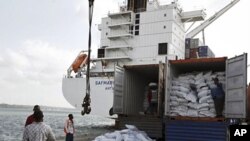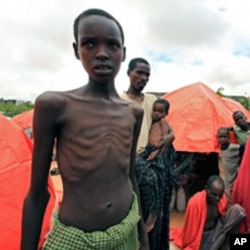The U.N. Children’s Fund is appealing to the air transport industry for free or heavily discounted cargo space to help transport emergency nutritional supplies to the Horn of Africa. UNICEF says hundreds of thousands of acutely malnourished children urgently need therapeutic treatment to keep them alive.
UNICEF spokeswoman, Marixie Mercado, says getting emergency supplies of food to malnourished children in the Horn of Africa as quickly as possible is a matter of life or death.
“There are over 2.3 million acutely malnourished children in the Horn of Africa. More than half a million will die if they do not get help within weeks. With therapeutic feeding a child can fully recuperate in a matter of four to six weeks," said Mercado. "We are asking the air transport industry for free or heavily discounted airline cargo space to transport this therapeutic food to children who will die without it.”
The worst drought to hit the Horn of Africa in 60 years is having a devastating affect upon the lives and livelihoods of millions of people. The United Nations reports nearly 12.5 million people in Kenya, Ethiopia, Djibouti and Somalia are facing starvation.
People in Somalia are particularly hard hit as they try to survive the twin disasters of conflict and drought. The United Nations warns famine, which is present in several regions of southern Somalia, is likely to spread throughout the entire region in the next two months.
The U.N. Office for the Coordination of Humanitarian Affairs or OCHA reports one quarter of Somalia’s 7.5 million people are either internally displaced or have fled to neighboring countries in search of assistance. It says about 1.25 million children across southern Somalia are in urgent need of life-saving assistance.
Mercado says UNICEF can help save these children’s lives if her agency can get special nutritional food to them quickly. She says UNICEF has more than 5,000 metric tons of emergency food in warehouses in Belgium, France and Italy.
She says this is enough to treat 300,000 malnourished children. She notes these supplies could be flown to Nairobi in a matter of hours. But, air transport is extremely costly.
“A cargo jumbo jet, for instance costs about $350,000 to transport 100 metric tons of therapeutic food from France to Nairobi. And, that cost is pretty much equivalent of the cost of the cargo itself," said Mercado. "The other alternative is via sea and we are setting up a pipeline for doing this. But, we have a six-week gap, which means that we need to transport 400 metric tons per week via air.”
The funding situation for humanitarian operations for the Horn of Africa is dire. OCHA reports the U.N.’s Drought Appeal is only 44 percent funded. It says $1.4 billion more is urgently required.
UNICEF is asking for $314 million as its part of this consolidated appeal. To date, the agency has received about one-third of this sum, which it says is far too little to do what needs to be done.
UNICEF spokeswoman Mercado says over the past week, British Airways, Lufthansa, UPS, Virgin and Cargo Luxos have offered to transport some of the emergency supplies to Nairobi free of charge for a limited period of time.
She says she hopes these offers will inspire other airlines to step forward.





